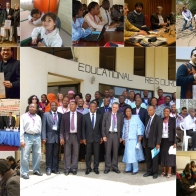
The IBE-UNESCO Diploma in Curriculum Design and Development runs its 10th consecutive edition partnered with the UNESCO Division of Teaching, Learning and Content, the Open University of Tanzania (OUT), the Catholic University of Uruguay (UCU), and with the support of the Hamdan Bin Rashid Al Maktoum Award for Distinguished Academic Performance. On 31 August 2015, the 6th edition in Latin America and the Caribbean will kick off. Four editions have been implemented so far in Africa.
The accredited diploma course is a one-year programme with the aim of strengthening countries capacities – mainly targeting policy makers, curriculum developers and specialists, supervisors, principals, teacher trainers and quality assurance officers - to design, develop and assess quality curricula for all. The training is grounded on a personalized blended learning model consisting of 10 days face-to-face and 30 weeks on-line, supported by tutors. The core training materials - the IBE Curriculum Resource Pack and the series of thematic modules on current and critical curriculum issues - share cutting edge knowledge on curriculum trends, issues and practices from an international comparative perspective. Participants have the opportunity to reflect upon their contexts and exchange with colleagues from numerous countries.
To date, a total of 406 participants (54% female and 46% male) from 62 countries have attended the Diploma (41 countries in the Africa programme, 21 countries in the Latin America and the Caribbean programme) with an average graduation rate of 85%. Overall, 95% of Diploma participants were positive about their learning experience. Different performance indicators have shown widespread satisfaction with the programme delivery.
The trace of the diploma impact has revealed promising results at the country level. Among them:
(1) Strengthening the prominence of curriculum in education systems and relating to national development aspirations and goals;
(2) Improving leadership for curriculum development, implementation and innovation processes;
(3) Prompting and sustaining national curriculum reforms;
(4) Bridging gaps between the intended, the experienced, the implemented and the attained curriculum;
(5) Embedding assessment within the curriculum development process; and
(6) Fostering the mobilization of knowledge, initiatives, expertise and resources across regions.
IBE plans to expand the diploma course to the Arab Region in 2016 and to Asia and other regions within the next two to three years. Likewise, we are exploring possibilities of further expanding training opportunities through a master degree in curriculum and learning embedded in the 2030 Education Agenda.
The IBE-UNESCO welcomes educators to join the Diploma journey.